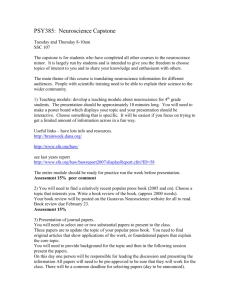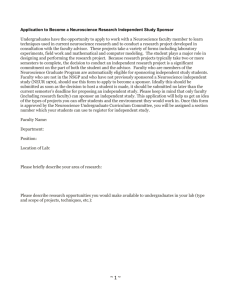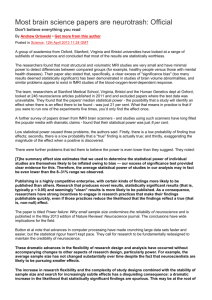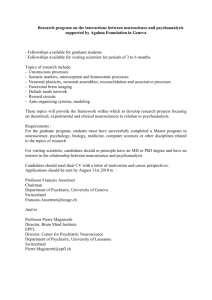snapshot report - UCLA Brain Research Institute
advertisement
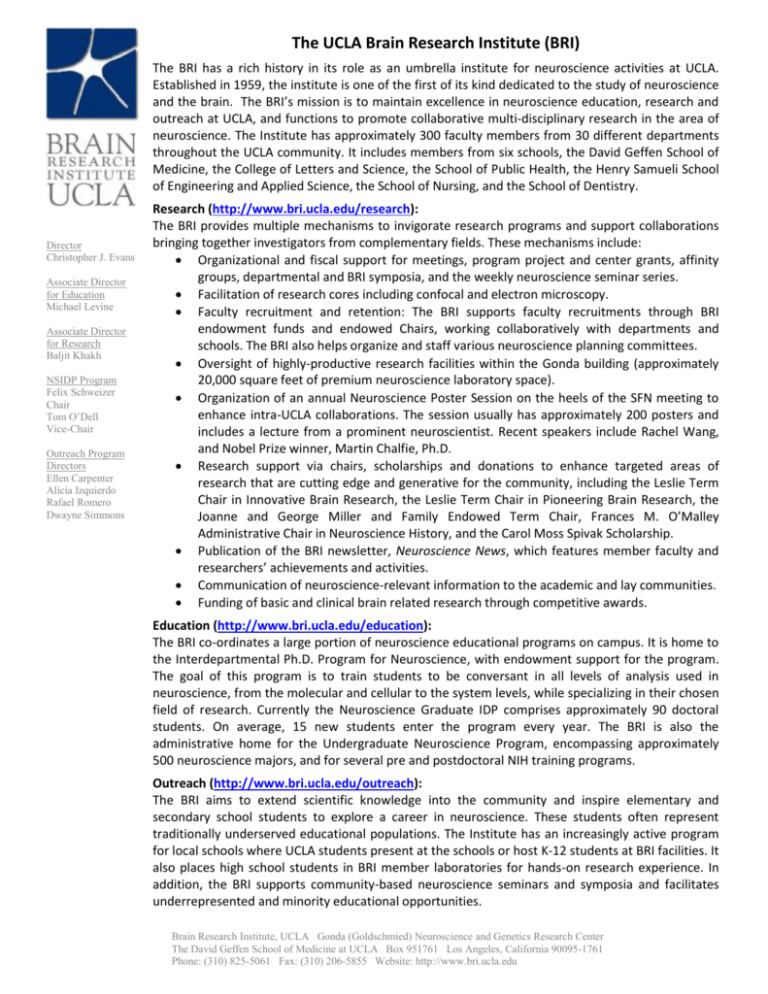
The UCLA Brain Research Institute (BRI) The BRI has a rich history in its role as an umbrella institute for neuroscience activities at UCLA. Established in 1959, the institute is one of the first of its kind dedicated to the study of neuroscience and the brain. The BRI’s mission is to maintain excellence in neuroscience education, research and outreach at UCLA, and functions to promote collaborative multi-disciplinary research in the area of neuroscience. The Institute has approximately 300 faculty members from 30 different departments throughout the UCLA community. It includes members from six schools, the David Geffen School of Medicine, the College of Letters and Science, the School of Public Health, the Henry Samueli School of Engineering and Applied Science, the School of Nursing, and the School of Dentistry. Director Christopher J. Evans Associate Director for Education Michael Levine Associate Director for Research Baljit Khakh NSIDP Program Felix Schweizer Chair Tom O’Dell Vice-Chair Outreach Program Directors Ellen Carpenter Alicia Izquierdo Rafael Romero Dwayne Simmons Research (http://www.bri.ucla.edu/research): The BRI provides multiple mechanisms to invigorate research programs and support collaborations bringing together investigators from complementary fields. These mechanisms include: Organizational and fiscal support for meetings, program project and center grants, affinity groups, departmental and BRI symposia, and the weekly neuroscience seminar series. Facilitation of research cores including confocal and electron microscopy. Faculty recruitment and retention: The BRI supports faculty recruitments through BRI endowment funds and endowed Chairs, working collaboratively with departments and schools. The BRI also helps organize and staff various neuroscience planning committees. Oversight of highly-productive research facilities within the Gonda building (approximately 20,000 square feet of premium neuroscience laboratory space). Organization of an annual Neuroscience Poster Session on the heels of the SFN meeting to enhance intra-UCLA collaborations. The session usually has approximately 200 posters and includes a lecture from a prominent neuroscientist. Recent speakers include Rachel Wang, and Nobel Prize winner, Martin Chalfie, Ph.D. Research support via chairs, scholarships and donations to enhance targeted areas of research that are cutting edge and generative for the community, including the Leslie Term Chair in Innovative Brain Research, the Leslie Term Chair in Pioneering Brain Research, the Joanne and George Miller and Family Endowed Term Chair, Frances M. O’Malley Administrative Chair in Neuroscience History, and the Carol Moss Spivak Scholarship. Publication of the BRI newsletter, Neuroscience News, which features member faculty and researchers’ achievements and activities. Communication of neuroscience-relevant information to the academic and lay communities. Funding of basic and clinical brain related research through competitive awards. Education (http://www.bri.ucla.edu/education): The BRI co-ordinates a large portion of neuroscience educational programs on campus. It is home to the Interdepartmental Ph.D. Program for Neuroscience, with endowment support for the program. The goal of this program is to train students to be conversant in all levels of analysis used in neuroscience, from the molecular and cellular to the system levels, while specializing in their chosen field of research. Currently the Neuroscience Graduate IDP comprises approximately 90 doctoral students. On average, 15 new students enter the program every year. The BRI is also the administrative home for the Undergraduate Neuroscience Program, encompassing approximately 500 neuroscience majors, and for several pre and postdoctoral NIH training programs. Outreach (http://www.bri.ucla.edu/outreach): The BRI aims to extend scientific knowledge into the community and inspire elementary and secondary school students to explore a career in neuroscience. These students often represent traditionally underserved educational populations. The Institute has an increasingly active program for local schools where UCLA students present at the schools or host K-12 students at BRI facilities. It also places high school students in BRI member laboratories for hands-on research experience. In addition, the BRI supports community-based neuroscience seminars and symposia and facilitates underrepresented and minority educational opportunities. Brain Research Institute, UCLA Gonda (Goldschmied) Neuroscience and Genetics Research Center The David Geffen School of Medicine at UCLA Box 951761 Los Angeles, California 90095-1761 Phone: (310) 825-5061 Fax: (310) 206-5855 Website: http://www.bri.ucla.edu Snapshot of BRI Activities & Programs Research: Multi-Investigator Research Grants pre-award services offered through the BRI. Core Facilities: Support for Carol Moss Spivak/CNSI Cell Imaging Core; Microscopic Techniques Core; Electron Microscopy Services Core, and emerging Transgenic Core. Joint Seminars in Neuroscience: Approximately 28 weekly guest lectures per year. Additional Neuroscience Lectures: Over 50 special lectures per year sponsored or co-sponsored by the BRI. Affinity Group Programs: 24 Affinity Groups with associated activities; meetings, seminars and conferences. Currently funded Affinity Groups: Adolescent Neuroscience; Astrocyte Biology; Autism; Brain-Mind-Body Interactions; Brain Tumor; Circadian and Sleep; Computational Neuroscience; Immunology in Neuroscience; Inner Ear; Songbird Research; Stress, Pain & Emotion; Synapse to Circuit; Visual Neurosciences; and Zebra Fish. Integrative Neuroscience Centers of Excellence: Addiction, Learning and Memory, Neural Repair, and Neurogenetics. Symposia, Conferences, and Workshops. Samples include: Neural Circuits, UCLA-Oxford Summit on Parkinson’s Disease; Learning and Memory; Neurobiology of Stress; Synaptic Biophysics and Excitable Cell Physiology. Annual Poster Sessions: UCLA Neuroscience Poster Day and Distinguished Lecture; Undergraduate Neuroscience Poster Session. Calendars/ Newsletters/Reports/Website: Annual BRI Calendar; Bi-Weekly Neuroscience Calendar; BRI Annual Report; Neuroscience News newsletter; BRI website. BRI Space and Recruitment: Programmatic space allocation and faculty recruitment for the Gonda building, neuroscience floors. Neuroscience History Archives: Provide endowed chair and administrative support. Education: Interdepartmental Ph.D. Program for Neuroscience. Administratively support program leadership, recruitment, admissions, curriculum, ARCS fellowship program coordination, course development, course assessment, course coordination, TA selection, student evaluation, student advising, student financial aid, mentor evaluation, faculty membership, website, publications, annual Neuroscience Interdepartmental Ph.D. Program Retreat, and BRI endowment providing partial funding for first year students. Undergraduate Neuroscience Interdepartmental Program. Oversight of staffing for Undergraduate Neuroscience Interdepartmental Program, administrative and IT support, and financial support for selected undergraduate activities. Neuroscience Training Grants submitted, administered and/or financially* supported through the BRI: NIH T32 - Interdepartmental Clinical Pharmacology NIH T32 - Neuroendocrinology, Sex Differences and Reproduction NIH T32 - Neural Microcircuits* NIH T32 - Neurobehavioral Genetics* NIH T32 - Translational Neuroscience of Drug Abuse* UC - Historically Black Colleges and Universities Summer Research Internship Support Grant (UC-HBCU) Outreach: Project Brainstorm and InterAxon Science Outreach Programs and Brain Awareness Week: Graduate and Undergraduate Neuroscience Student Coordinated K-12 Outreach Programs, BRI BAW Demonstrations and Tours. BRI-SURE and NeuroCamp Programs - High School and Undergraduate Research Placement Programs: Placement of high school and undergraduate students in BRI member laboratories. High School Addiction Outreach Program and co-Sponsor Los Angeles Brain Bee annual competition: Educational opportunities for high school students. General: BRI Awards: BRI-CTSI Team Science Awards; BRI Core Voucher Awards, Annual Eiduson Lecture Prize (pre doctoral award); Mary Eva Kavan Prize for Excellence in Brain Research (pre doctoral award); Travel Awards to the Annual Meeting of the Society for Neuroscience (pre and post doctoral awards), Fine Science Tools Postdoctoral Awards; BRI Postdoctoral Lecture Award. Endowments and Fundraising. The BRI facilitates the flow of funding from donors to faculty for research, teaching and service missions. The BRI provides program support via an endowed Chair, three term chairs, two administrative chairs, scholarships, general endowment funds, and several funds for specific research areas. Coordination of UCLA Chapter for the Society for Neuroscience activities. For a complete understanding of the UCLA Brain Research Institute and a list of members, please visit: www.bri.ucla.edu DO NOT PRINT THIS PAGE BRAIN RESEARCH INSTITUTE AFFINITY GROUPS Adolescent Neuroscience (Coordinated by Adriana Galvin) Astrocyte Biology (Coordinated by Dr. Baljit Khakh) Autism (Coordinated by Dr. Daniel Geschwind) Brain-Mind-Body Interactions (Coordinated by Dr. Michael Irwin) Circadian and Sleep Medicine (Coordinated by Christopher Colwell) Computational Neuroscience (Coordinated by Dr. Ladan Shams) Higher Cognitive Function (Coordinated by Dr. Arnold Scheibel) Immunology in Neuroscience (Coordinated by Dr. James Waschek) Inner Ear (Coordinated by Dr. Felix Schweizer) Learning, Memory and Plasticity (Coordinated by Dr. Alcino Silva) Neural Repair (Coordinated by Dr. Marie-Francoise Chesselet) Neural Stem Cells (Coordinated by Dr. Harley Kornblum) Neurobiology of Drosophila and C Elegans (Coordinated by Dr. David Krantz) Neuroendocrinology (Coordinated by Dr. Arthur Arnold) Neurogenetics (Coordinated by Dr. Xiangdong William Yang) Neurophysics and Neuroengineering (Coordinated by Mayank Mehta) Neuroscience History (Coordinated by Dr. Joel Braslow) Parkinson‛s Disease (Coordinated by Dr. Marie-Francoise Chesselet) Songbird Affinity Group (Coordinated by Dr. Stephanie White) Stress, Pain and Emotion (Coordinated by Dr. Emeran Mayer) Synapse to Circuit Club (Coordinated by Dr. Kelsey Martin) Zebra Fish (Coordinated by Dr. Alvaro Sagasti)


